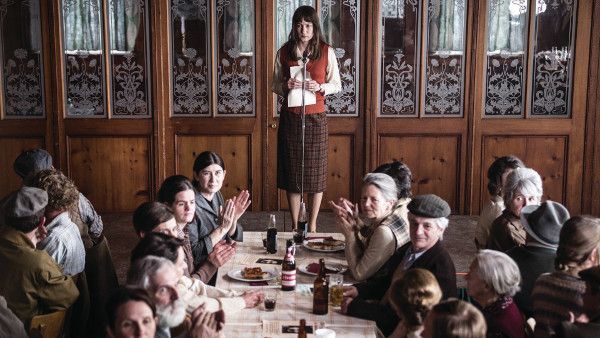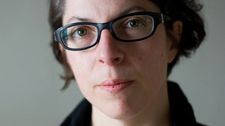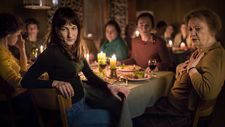 |
| Petra Volpe: 'If you want to change a society deeply, it really starts in your own home and how you treat each family member' Photo: Zodiac Pictures |
Speaking to Volpe the week before her film had its UK premiere at Glasgow Film Festival, we spoke about the way she has caught the latest ‘wave’ of feminism, as discussions about representation in Hollywood in the wake of the Harvey Weinstein scandal, and equality more generally come back to the fore.
“When we made the film, we weren’t aware of how extremely timely the film would be but, of course, even back then, themes of gender inequality and injustice against women was still a big thing in society, it was just not talked about so much,” says the director.
“I think, for women, it was there all along and unfortunately, when I was researching the film I was also constantly in shock because when you have it in front of your eyes – when you look at something women fought for in the Seventies and you think about your own life or the life of your mother or grandmothers and you realise how many things have changed but how many things have not changed. Even back then, it was very clear to me that this subject was not just historical.
“But with Trump and a year later the #MeToo movement, all these subjects are completely out in the open and it’s so obvious that we are still dealing with a very deep, systemic sexism against women.”
The Oscars have again brought that systemic sexism into sharp focus. Just taking the foreign language Oscar as an example, there were a record 92 submissions, of these, 26 were by female directors or co-directors – with only one, Ildikó Enyedi’s On Body And Soul making it through to the final shortlist. Taking the awards in general, the picture isn’t any better with only six out of 33 statuettes being taken home by women – two of which were, of course, in female-only categories.
Volpe believes we need to broaden our idea of what the challenges are.
 |
| Petra Volpe: My most important political act is to make my movies' |
In the film, however, it is the men who essentially hold the cards. They can decide whether their wife takes a job and it is they who eventually had to vote on whether women could take part in elections.
“It was very much in my mind that women are still not, in a way, treated like subjects in society,” says Volpe. “Like if you look, for example, at advertising or pop culture, women are always objects. That’s what we teach girls also – you can be looked at, you have to be pretty, someone can do something with you – but they are not subjects. For me, that was the very basis of this problem that women are still not seen as full equal people on the same level. And I think that is rooted in a very deep idea of society, to do with the divine order that ‘women are not equal’. I think this idea is very deep and it’s linked to religion and the idea of bourgeoise society and this very notion of who is a citizen and who not. So this is all still very prevalent in our society.”
Volpe believes that if we want to change things permanently, it has to start with children. “There’s still so much work to be done there,” she says. “If you want to change a society deeply, it really starts in your own home and how you treat each family member. Then it starts in schools and in school books, what do you teach kids? And how do you teach a world where women are equally important?
“For example, when I started to make this movie, I hadn’t learned anything about this in school. Women weren’t just sitting back and waiting to get the vote, there was a very passionate and vivid women’s movement in Switzerland. For 100 years there was almost a parallel society of women who did politics, who were organised, they went to big congresses abroad, they were networking with big women’s networks and were dealing with big issues in society. They didn’t have any political rights but they were present and very important for Swiss society – and I didn’t know anything about this. And I’m already a very ‘woke’ person. So I learned that women didn’t have the right to vote but I didn’t learn anything about the women’s movement.
 |
| Petra Volpe: 'I always say when I have Q&As, you could tell the world’s history from a women’s perspective and it would be equally heroic and triumphant and interesting' Photo: Zodiac Pictures |
Radio 4 recently ran an Analysis programme in which Mary Ann Sieghart explored the way in which even women tend to have an unconscious bias against women. Volpe agrees.
“You also have to work really hard to change the inner biases you have. Even us, we grow up still in such a sexist world, we have inner images that have to be changed and it starts there.”
In terms of research, Volpe went to the Women’s Archive, near Bern, that was founded by Marthe Gostelli, who Volpe describes as “one of the most fierce feminists in Switzerland”. Gostelli, who died last year, dedicated her life to women’s rights. “I did a long interview with her and spoke to a lot of women who were part of the movement,” adds Volpe. “Then, of course, I spoke to my mother and read a lot of the American feminists to understand the context of the time – where were the women compared to what was happening in the world. Just to really understand this particular atmosphere in Switzerland that made it possible that it took so long. I did really extensive research and all the characters you see in the movie are inspired by this research.”
If all this sounds terrible worthy and dry, the film is anything but. Although the subject matter is serious, Volpe handles it with a light touch and finds time to see the funny side of some of the situations Nora finds herself in.
“That was, from the very beginning, my intention because I truly believe that humour and drama aren’t contradictions, on the contrary, they go very well together,” says Volpe. “The more existential the conflict, the better it is for humour, actually. I think that humour is a tool to open people’s hearts and minds and when people are allowed to laugh they’re also more open to the painful aspects of a story. “I thought, I want to show that it’s possible to make a political feminist movie that’s funny, but not funny in a way that makes fun of the people, but that gives you permission to laugh and to laugh a little bit at yourself. That was very important from the beginning and that was a very thin line to walk, not just when we were shooting the movie but in the editing and the music, how we were balancing the humour so that it does not betray the story. So that was a big challenge but also an interesting process.”
One of the funniest scenes involves a workshop where the women are encouraged to look at their vaginas – which are described as animals, including a tiger and a butterfly.
 |
| The Divine Order. Petra Volpe: 'It was very clear to me that this subject was not just historical' Photo: Zodiac Pictures |
“These things are very linked and I’ve had a lot of funny Q&As with teenagers when they didn’t quite get that yet and boys would ask, ‘What do women’s rights have to do with orgasms?’ Then I would always take the opportunity and say, ‘Make sure your girlfriend comes.’ It’s very funny but it’s a fact even to this day. If you look at the data, it’s not only that women don’t have equal pay, there’s an orgasm gap. There’s all kinds of gaps and it stretches into everything that concerns women’s bodies.
“Now that we are having a backlash, it starts with their bodies. It stars with abortion rights and stuff like that. It’s always about controlling women and controlling their sexuality. I also believe that if women aren’t at home in their bodies and love their bodies they can’t really stand up for themselves. If you’re always dependent on the male gaze and you’re not inhabiting place, that’s not a very good place to come from and fight for something.” As the fight for equality continues in filmmaking and elsewhere, it’s not just the funding where problems remain. There’s also an issue with pushback against female-themed stories, as Phyllida Lloyd pointed out when I spoke to her last year about the problems she had getting Mamma Mia! made. “I think something is definitely moving right now,” says Volpe. “There’s also been statistics in Switzerland that came out two years ago that women only get 20 per cent of the funding and men 80 per cent. The statistics are so clear that the discrimination is so crass that you can’t just say it’s a fluke, you know. So in Switzerland at least they took measures and I think people are more conscious of the subject now and it is improving but, in my opinion, it’s just too slow.”
Things are also improving in the UK, where the BFI announced last year that the targets for the funding year beginning on April 1, will be a 50-50 gender balance in supported filmmakers, alongside a 20 per cent target for BAME filmmakers, a nine per cent target for LGBTQ-identifying filmmakers and a seven per cent target for filmmakers with a disability. “I look admiringly at Sweden,” says Volpe. “They have been very radical. The women who have been head of funding there said, ‘OK, 50/50. Women are 50 per cent of the population, so we give 50 per cent of the funding to women. Very simple.’.
“People [in film] think they want ‘the guy’. But actually films with a female lead are very successful. Very often, films made by women with women are cheaper and make more money. I don’t necessarily think that’s a good thing that they’re cheaper but I think it’s another idea that people have which isn’t true any more. People have a lot of beliefs in their head about what they think is true but if you look at the reality it’s not necessarily true.
“We’re living in the age of fake news. People can just say what they want. We are living in a world where you can show people facts and they dismiss them, which is also a problem. But the most important thing is to make my movies, to encourage my colleagues to make their movies, to support young filmmakers and my most important political act is to make my movies.”
Volpe – who is now working on a six-part historical series for Swiss television as well as a film set in a men’s prison adds: “People are, in general, very scared of change. People always prefer the bad they know than the unknown. If you go to countries and observe how they vote, they will always vote for a system they know, even though it’s bad, than for a system they don’t know. It’s something quite universal and sad and people have to be encouraged to be more courageous and embrace change.”
The Divine Order is available to watch on demand from Vimeo.
Watch the trailer:





















